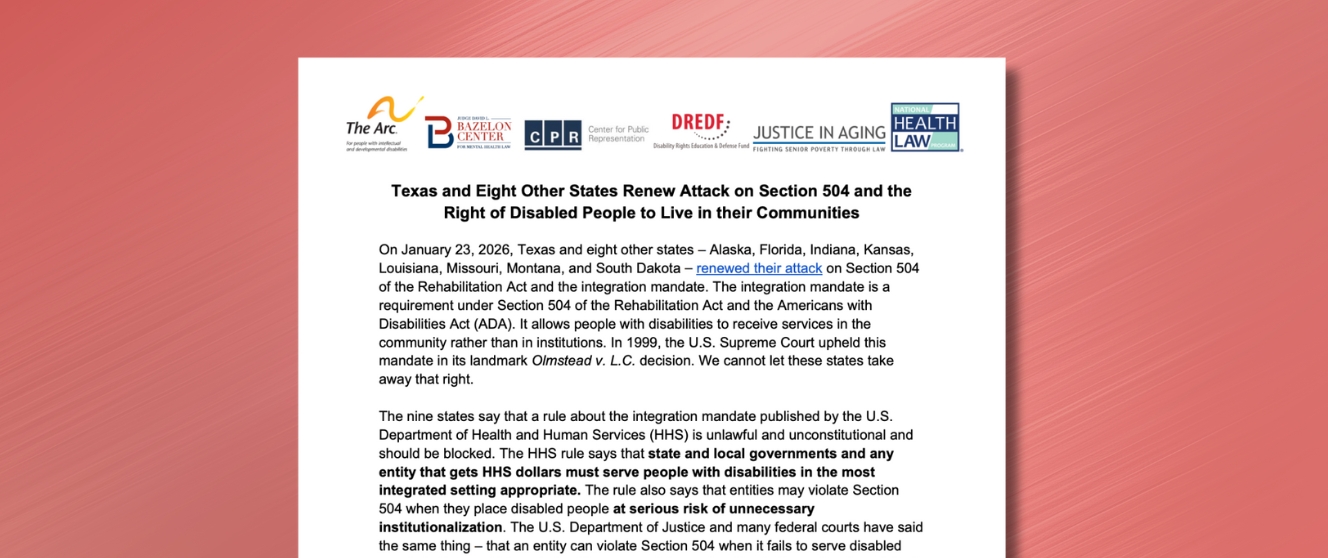
For Immediate Release — October 20, 2009
Contact:
Julia Epstein
510-644-2555, ext. 241
510-406-4048 (cell)
jepstein@dredf.org
American Council of the Blind and 3,000,000 Blind and Visually Impaired SSA Recipients Win Major Legal Victory
Class Action Ruling Announced in American Council of the Blind v. Social Security
Case #: C 05-04696 WHA
San Francisco, California — Judge William Alsup of the US District Court, Northern District of California in San Francisco, today issued a judgment in favor of the American Council of the Blind (ACB) and two classes of 3,000,000 individuals with blindness and visual impairments. The suit challenged the Social Security Administration’s (SSA) failure to provide its critical benefits communications to recipients in alternative formats that would enable people with visual impairments to have equal access to SSA programs as required by federal disability civil rights laws.
This ruling signals a major victory for the disability rights movement, and it sets a precedent for the obligations of other federal and state agencies to accommodate people who are blind or have visual impairments. The Social Security Administration (SSA) sends out 390 million notices and forms each year. Plaintiffs won the right to receive communications in a format that is accessible to them, and Judge Alsup ruled that these formats, at a minimum, must include Braille and CD.
Not until the lawsuit was filed in 2005 did the Social Security Administration acknowledge that it was covered by anti-discrimination laws that protect people with disabilities. Judge Alsup observed in his ruling that the agency “has not given primary consideration to the requests of the blind and visually impaired for alternative formats.” Judge Alsup cited the hardships that the plaintiffs endured because SSA sent them critical notices in print that they could not read or respond to. Examples cited by the court:
Mary Ann Alexander, of East Stroudsburg, PA, received SSA notices she couldn’t read about reductions in her daughter’s SSA benefits. She ended up losing all benefits and suffering financial hardship for the 14 months it took to resolve the agency error and restore the benefits.
Arlene Doherty, of San Francisco, who is age 74, received an application from SSA to complete within 10 days or risk losing her benefits. The application contained circled questions to answer, check marks where she was to sign, and instructions to initial any corrections. SSA didn’t call to help her with this application, which she could not read or fill out. When the agency suspended her benefits, she became destitute. She was unaware that she could have applied for a hardship waiver.
SSA reduced Marvelena Quesada’s SSI benefits due to an overpayment that came about because, being unable to access the program rules, she did not realize she had to report blind work expenses. During the several months it took to sort this out, Ms. Quesada could not buy necessities, including groceries, and had to borrow money and use credit, accumulating a significant amount of debt that was difficult to repay.
Arlene Mayerson, Directing Attorney for the Disability Rights Education and Defense Fund (DREDF), emphasized that providing alternative formats to blind and visually impaired individuals is a civil right to equal access analogous to providing ramps for wheelchair users. She urged other agencies to take stock in light of the legal precedent established in the order.
Henry Su, a partner at Howrey LLP, DREDF’s co-counsel, stated:
“we became involved with the case because the plaintiffs’ lack of access to critical information was egregious and unfair, especially given the range of assistive technologies and aids available and in wide use today. We got to know the plaintiffs and as their personal stories illustrate, what should be routine management of their day-to-day affairs quickly turns into a complex and aggravating mess when they cannot access a simple but important printed letter.”
“Blind people across the country have been trying for years to get SSA to send notices in a format we can read, and up until this ruling, we have been resoundingly ignored.” commented American Council of the Blind President, Mitch Pomerantz. “This is a great civil rights victory.”
Judge Alsup’s ruling
and
Findings.
Attorneys for the plaintiffs included the Disability Rights Education and Defense Fund; Howrey LLP; the National Senior Citizens Law Center; and Disability Rights Oregon (formerly the Oregon Advocacy Center).
The American Council of the Blind is the nation’s leading consumer based advocacy organization working on behalf of blind and visually impaired Americans and has more than 70 state and special-interest affiliates throughout the United States. The national office of the organization is located in Washington, D.C. For more information about the ACB, visit the website at www.acb.org.
Founded in 1979, by people with disabilities and parents of children with disabilities, the Disability Rights Education and Defense Fund (DREDF) is a national law and policy center dedicated to protecting and advancing the civil rights of people with disabilities through legislation, litigation, advocacy, technical assistance, and education and training of attorneys, advocates, persons with disabilities, and parents of children with disabilities. For more information, go to dredf.org.
Howrey LLP is an international law firm with advocacy capabilities within three principal areas of law – Antitrust, Intellectual Property and complex Commercial Litigation and Arbitration. Each practice area has more than 200 experienced attorneys. The firm is committed to the tenets of pro bono and public service. In 2008, Howrey devoted over 75,000 hours to pro bono matters on behalf of more than 450 clients—services valued at $27.8 million. For more information, visit www.howrey.com.
The National Senior Citizens Law Center advocates nationwide to promote the independence and well-being of low-income elderly individuals and persons with disabilities. NSCLC provides technical assistance and training to attorneys and other advocates and is active in litigation and policy advocacy with a strong focus on income security and health care. For more information, go to the organization’s website at www.nsclc.org.
Disability Rights Oregon (DRO) (formerly the Oregon Advocacy Center) is an independent non-profit organization that provides legal advocacy services for people with disabilities anywhere in Oregon. DRO is designated under federal law as the protection and advocacy system for Oregon, but it is not a part of the state or federal government. DRO has attorneys and advocates who assist people with disabilities. For more information, go to www.disabilityrightsoregon.org.

